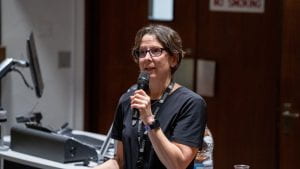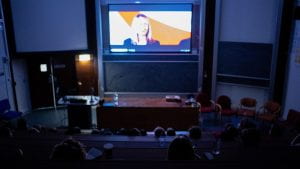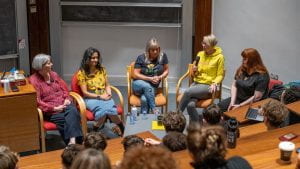 Dr Fiona Spotswood from the University of Bristol Business School and Professor Martin Hurcombe from the School of Modern Languages recently co-hosted a day of events exploring the consumption and representation of women’s sport. Their focus was on the historical exclusion within the realm of women’s sports and the exploration of opportunities for future change.
Dr Fiona Spotswood from the University of Bristol Business School and Professor Martin Hurcombe from the School of Modern Languages recently co-hosted a day of events exploring the consumption and representation of women’s sport. Their focus was on the historical exclusion within the realm of women’s sports and the exploration of opportunities for future change.
Dr Spotswood and Professor Hurcombe lead a research project called Fostering Inclusive Action Sports (FIAS), focused on understanding and addressing gender inequality in Action Sports like mountain biking. Their work has been funded by the British Academy and Policy Support Fund and garnered support from influential partners such as British Cycling, Forestry England, Welsh and Scottish Cycling, and the International Mountain Bike Association.
An insightful academic symposium
On 13th March, Dr Spotswood and Professor Hurcombe chaired an academic symposium followed by a public screening of the highly acclaimed documentary ‘Game On: The Unstoppable Rise of Women’s Sport’. The film screening was followed by a panel discussion. The headline guest for the day was Sue Anstiss MBE, author of the ‘Game On’ book and director of the film. She was joined by a diverse array of speakers1 from various academic disciplines, grassroots sports, sports leadership, and policy.
The academic symposium, titled ‘Learning from the Lionesses: Transformative Media and Marketing for Inclusive Sport’, provided a platform for scholars across multiple disciplines to share research, perspectives, theory and ideas in relation to gender and sport, and the gendering of sport. The discussion encompassed various themes such as the visual culture of sport, feminist perspectives on sport’s future, men’s experiences of coaching women, feminist historical perspectives of football fandom, postfeminist critiques of sports and physical activity femvertising, women’s experiences of participation in male dominated sportscapes, and many other ideas and questions.
An emotional film screening experience
The film screening in the afternoon provided an opportunity to bring together academics, school students, members of the Women’s Sport Collective, local business people, sports leaders, and athletes. We were pleasantly surprised by the attendance of Pamela Cookey, former England netballer, who also appears in the film. The GCSE PE cohort from Clifton High School also came to the University campus to watch the film, and the perspectives of the teenage boys and girls added richness to the discussion.
athletes. We were pleasantly surprised by the attendance of Pamela Cookey, former England netballer, who also appears in the film. The GCSE PE cohort from Clifton High School also came to the University campus to watch the film, and the perspectives of the teenage boys and girls added richness to the discussion.
“Watching the film together was a special, emotional experience,” explained one of the audience members. The film is beautifully made, well balanced in its content and provides numerous challenges and questions throughout. It does not present a fully optimistic, positive stance on women’s sport, but instead interrogates the history of women in sport and the challenges we continue to face. Nevertheless, it is uplifting, and it feels good to come together to celebrate women’s achievements in sport.
Perspectives from the panel
 The panel discussion brought together numerous perspectives from policy, practice, grassroots sport, and academia to facilitate conversations provoked by the film. The panel fielded questions from the audience and were impressed with the quality of the questions, especially from the teenage audience members. Some questions discussed were how women’s sport can avoid parodying men’s sport, how important male allyship is in sports development, how football can ‘steal’ the limelight and leave other sports fighting for airtime, how important it is that people use their platforms to push for change, and how women-led sports organisation offers a means to shape a future of sport that is more inclusive to all. The panel also delved into the power of marketing, brands, and the importance of authenticity. The discussions resulted in more questions than answers, yet they also fostered additional connections and collaborations compared to the start of the day. These conversations continued long after the panel discussion had ended.
The panel discussion brought together numerous perspectives from policy, practice, grassroots sport, and academia to facilitate conversations provoked by the film. The panel fielded questions from the audience and were impressed with the quality of the questions, especially from the teenage audience members. Some questions discussed were how women’s sport can avoid parodying men’s sport, how important male allyship is in sports development, how football can ‘steal’ the limelight and leave other sports fighting for airtime, how important it is that people use their platforms to push for change, and how women-led sports organisation offers a means to shape a future of sport that is more inclusive to all. The panel also delved into the power of marketing, brands, and the importance of authenticity. The discussions resulted in more questions than answers, yet they also fostered additional connections and collaborations compared to the start of the day. These conversations continued long after the panel discussion had ended.
Dr Spotswood took to LinkedIn to express her gratitude and appreciation to those who came together to make the Game On day so special and important:
“Thank you so much Sue Anstiss MBE for coming to Bristol to share your wonderful film with us. Thank you to the symposium and panel members, whose thoughtful, insightful and intelligent questions provided a showcase of how important sport is to us all, how important social justice and equality are in sport, and sport is to a fair and progressive society. Thanks to all involved in a wonderful day celebrating, discussing and imagining the trajectory of women’s sport.”
Find out more about the research on inequality in action sports.
1 Academic speakers:
- Professor Kath Woodward (Open University), ‘Change in Sport: Giant Leaps or Keeping up the Pressure’.
- Dr Luke Jones (University of Bath), ‘Navigating the Coaching Context in Contemporary Women’s Football‘.
- Dr Jess Francombe-Webb (University of Bath), ‘Postfeminist Sports Cultures: Exploring (In)Active Women’s Experiences’.
- Dr Fiona Spotswood (University of Bristol), ‘Women’s Media Practices and the Construction of a New Era in Mountain Biking’.
- Dr Sheree Bekker (University of Bath), ‘Feminist Sport: Defiance, subversion, challenge and change’.
- Professor Martin Hurcombe (University of Bristol), ‘Masculinity, Sports Culture and the Press: Understanding Enduring Issues through the History of Sports Journalism’.
- Professor Mike O’Mahony (University of Bristol), ‘Anyone for Tennis?’.
- Dr Katie Liston (Ulster University, Belfast), ‘Public Service Broadcasting and Gender Equal Coverage: Reflections on Research and Practice in Ireland and Sweden’.
- Professor Jean Williams (independent), ‘Femorabilia: A Feminist Critique of Football’s Fast Fashion’.
Panel discussion guests:
- Sue Anstiss MBE: Author and director of Game On: The Unstoppable Rise of Women’s Sport, CEO of Fearless Women, a founding trustee of the Women’s Sport Trust and co-founder of the Women’s Sport Collective – a network for all women working in sport.
- Aoife Glass: Digital Communities Manager for the IWG (International Working Group) on Women and Sport, former cycling journalist, digital editor and science communicator, award-winning podcast producer (Spindrift Podcast).
- Zoe Woodman: Charity co-ordinator of girlsAlive, an all-female, non-competitive community sports club for women of all ages and abilities set up to tackle inequality in sports participation and bringing life-changing improvements to the physical and mental health of women.
- Aneela McKenna: Professional mountain bike guide and coach, equality, diversity, inclusion (EDI) & wellbeing consultant, specialising in supporting cycling and outdoors industry sectors, co-chair of British Cycling D&I Advisory Group.
- Jean Williams: Author of A Game For Rough Girls: A History of Women’s Football in England (Routledge 2003), A Beautiful Game: International Perspectives on Women’s Football (Berg 2007), Globalising women’s football (Peter Lang 2013), A Contemporary History of Women’s Sport (Routledge Research, 2011). Jean has recently published 50 Great Sportswomen (Aurora, 2022) and A History of Women’s Football (Pen and Sword 2022). Her new book is Legendary Lionesses – A history of the England women’s football team 1972-2022 (Palgrave 2024). Her latest documentary is Copa 71, which premiers in March 2024.
- Fiona Spotswood (Chair): Associate Professor of Marketing and Consumption, University of Bristol Business School, research lead for Project FIAS (Fostering Inclusive Action Sport), focusing on understanding and addressing gender inequality in mountain biking.

